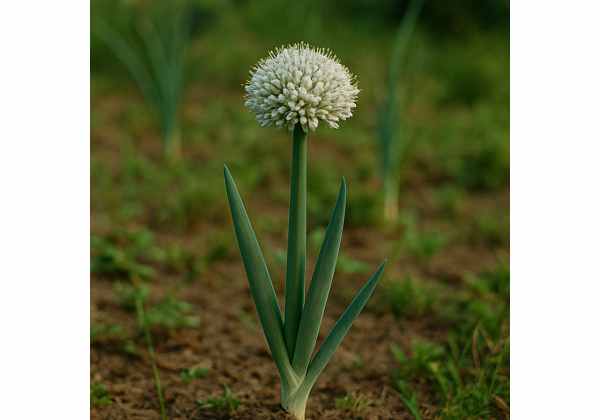Onions are one of the most versatile and celebrated culinary and medicinal herbs known worldwide. They pack an impressive profile of health benefits, active compounds, and healing properties that make them a staple in kitchens and natural medicine cabinets alike. Rich in antioxidants and anti-inflammatory agents, onions support cardiovascular health, bolster the immune system, and even aid in cancer prevention. Their bioactive constituents, such as flavonoids and sulfur compounds, contribute to their potency, while versatile culinary applications—from raw salads to simmered broths—underscore their enduring appeal. Discover how this humble bulb is much more than a food flavoring.
Table of Contents
- Botanical Characterization and Identification Traits
- Chemical Constituents and Bioactive Elements
- Health Advantages and Essential Attributes
- Applications, Preparation, and Precautions
- Research Insights and Landmark Discoveries
- Frequently Asked Questions About This Herb
Botanical Characterization and Identification Traits
Onions, scientifically known as Allium cepa, belong to the Amaryllidaceae family and have been cultivated for thousands of years across continents. Their evolutionary journey, marked by adaptation and resilience, has led to an array of varieties ranging from the pungent yellow to the mild and sweet red and white onions. This section delves into the botanical details that not only define the onion’s physical attributes but also underline its ability to thrive in diverse climates and soils.
Taxonomy and Morphology
At the core of its identity, the onion is a geophyte—a perennial plant that survives adverse seasons underground through its bulb. Taxonomically, it is placed in the order Asparagales and is closely related to garlic, leeks, and chives. The bulb, a swollen underground storage organ, is composed of fleshy, concentric layers that serve as a repository for nutrients and water, ensuring the plant’s survival during periods of dormancy. Above ground, long, hollow, and tubular leaves emerge, which are adapted to efficiently capture sunlight while minimizing water loss. The onion’s inflorescence, typically a dense umbel of small, star-shaped flowers, may be left to develop in seed-producing conditions, contributing to genetic diversity among cultivars.
Growth Conditions and Natural Habitat
Onions flourish in well-drained, fertile soils with a balanced pH, though they have been cultivated in a wide range of environmental conditions. Their adaptability is evidenced by the wide spectrum of climates—from temperate zones to subtropical regions—where they have been successfully grown. Historically, onions were prized not only for their flavor but also for their storage capacity, as the bulb’s composition allowed it to remain edible for long periods. In the wild, these plants often grow in open fields and disturbed soils, where the availability of nutrients and sunlight favors their rapid growth and development.
Historical and Cultural Significance
Throughout history, onions have held a revered position in various cultures and cuisines. Ancient civilizations, including the Egyptians, Greeks, and Romans, integrated onions into their diets and rituals, often attributing them with symbolic and healing properties. Their widespread use is a testament to their robust flavor and storability. Moreover, folklore from many regions celebrates the onion’s protective properties, ranging from warding off evil spirits to symbolizing abundance and fertility.
Identification in the Field
When identifying onions in the field, the distinct layered bulb, the papery outer skin, and the characteristic sharp aroma are telltale signs. Gardeners and botanists alike note that the leaves emerge in a rosette pattern, with a gradual tapering toward the base. The plant’s overall stature is relatively modest, yet its impact on culinary and medicinal traditions is immense. Detailed observation reveals subtle differences between varieties—such as the deeper purple hues in red onions or the smoother, milder textures in white onions—which may indicate variations in bioactive compound concentrations and flavor profiles.
Modern Cultivation and Breeding
Advancements in agricultural science have led to the development of numerous onion cultivars that cater to specific culinary needs and climate conditions. Modern breeding techniques focus on improving shelf life, disease resistance, and even the sensory properties of onions. For example, selective breeding has produced varieties with reduced pungency while maintaining high nutritional value—a crucial factor for consumers seeking health benefits without overwhelming flavors. Today, research continues to explore the genetic pathways responsible for flavor and bioactive compounds, promising even more tailored varieties in the future.
In summary, the onion’s botanical profile is a study in both simplicity and complexity. Its physical structure, adaptability, and historical significance combine to create a plant that is as much a culinary staple as it is a subject of scientific interest. Whether cultivated on a large scale or grown in home gardens, onions remain a vibrant reminder of nature’s ability to combine beauty, utility, and nutrition in one humble bulb.
Chemical Constituents and Bioactive Elements
Understanding the onion’s chemical composition is key to appreciating its wide-ranging health benefits. The onion is a veritable treasure trove of bioactive compounds, many of which contribute to its distinctive flavor, aroma, and therapeutic properties. Below is a numbered list that outlines the primary active constituents found in this allium vegetable, along with detailed insights into their roles and benefits.
- Quercetin
Quercetin is a potent flavonoid that functions as a powerful antioxidant. Its anti-inflammatory properties are well documented, and it plays a significant role in neutralizing free radicals. This compound contributes to cardiovascular protection, supports the immune system, and may reduce the risk of certain cancers by mitigating oxidative stress and inflammation. - Organosulfur Compounds
Onions contain a variety of sulfur-containing compounds, including thiosulfinates and other related molecules. These organosulfur compounds are responsible for the characteristic pungent aroma and have been linked to numerous health benefits. They exhibit antimicrobial properties, help lower blood pressure, and are believed to contribute to the reduction of cholesterol levels. These compounds also play a role in cancer prevention by influencing cellular signaling pathways. - Flavonoids (Other than Quercetin)
Beyond quercetin, onions boast an array of other flavonoids such as kaempferol and luteolin. These compounds provide additional antioxidant protection and are involved in modulating inflammation. They may also contribute to improved vascular health and offer protective effects against degenerative diseases by enhancing cellular resilience. - Anthocyanins
Particularly abundant in red onions, anthocyanins are pigments that not only give the vegetable its vibrant hue but also offer significant antioxidant properties. These compounds have been associated with reduced risks of cardiovascular diseases and improved visual health, while also supporting cellular defense mechanisms against oxidative damage. - Vitamins and Minerals
Onions are a rich source of essential vitamins such as vitamin C, which is crucial for immune function and collagen synthesis, and B vitamins, which aid in energy metabolism. Additionally, they provide minerals like potassium, which helps regulate blood pressure, and trace amounts of selenium and zinc, further contributing to overall wellness. This balanced nutrient profile complements the bioactive compounds to create a holistic approach to health. - Prebiotic Fibers
The natural sugars and fibers in onions act as prebiotics, nourishing beneficial gut bacteria. This prebiotic effect supports a healthy digestive system, which in turn plays a pivotal role in maintaining overall health and immunity.
These chemical constituents work synergistically to offer a wide range of therapeutic benefits. The interplay between antioxidants, anti-inflammatory agents, and essential nutrients creates a comprehensive health support system. The unique composition of onions not only enhances flavor but also makes them a potent ally in the prevention and management of various health conditions.
Extensive research continues to shed light on these bioactive elements, deepening our understanding of how each compound interacts within the human body. As modern science evolves, the intricate balance of these constituents in onions is likely to be leveraged in novel therapeutic applications and dietary recommendations, reinforcing the timeless value of this humble vegetable.
Health Advantages and Essential Attributes
Onions offer an impressive array of health benefits that extend far beyond their culinary appeal. Their diverse bioactive compounds work in concert to provide numerous advantages, promoting overall well-being. In this section, we explore the key health benefits and core qualities that make onions an essential component of a balanced diet and natural wellness regimen.
Cardiovascular Health
Regular consumption of onions has been linked to improved heart health. The flavonoids and organosulfur compounds present in onions contribute to lowering blood pressure, reducing cholesterol levels, and enhancing blood circulation. These compounds help to prevent the buildup of arterial plaque, thereby reducing the risk of heart disease and stroke. By promoting vascular health, onions play a vital role in maintaining a strong cardiovascular system.
Anti-Inflammatory and Antioxidant Effects
One of the most celebrated benefits of onions is their potent anti-inflammatory and antioxidant properties. The high levels of quercetin and other flavonoids work together to combat oxidative stress and reduce inflammation at the cellular level. This not only protects the body from chronic diseases but also supports the immune system, helping to ward off infections and illnesses. The cumulative effect of these properties is a reduction in overall bodily inflammation, which is crucial in the prevention of various degenerative conditions.
Cancer Prevention and Cellular Health
Studies have demonstrated that the organosulfur compounds in onions may help to inhibit the growth of cancer cells. These compounds interfere with tumor development by promoting apoptosis (programmed cell death) in abnormal cells and reducing the proliferation of malignant cells. Additionally, the antioxidant capacity of onions helps to protect cellular DNA from damage, further contributing to cancer prevention strategies. While onions are not a cure-all, their inclusion in a balanced diet is widely regarded as a proactive measure in cancer risk reduction.
Immune System Support
The vitamins, minerals, and bioactive compounds in onions work synergistically to enhance immune function. Vitamin C, in particular, plays a pivotal role in supporting the body’s natural defense mechanisms. Combined with the antimicrobial properties of sulfur compounds, onions help fortify the immune system, making it more effective at combating pathogens and infections. This makes them a valuable dietary addition during times of seasonal illnesses or when the immune system needs a boost.
Digestive and Metabolic Benefits
Onions contain prebiotic fibers that nourish the beneficial bacteria in the gut. A healthy gut microbiome is essential for effective digestion, nutrient absorption, and overall metabolic health. These fibers not only improve digestive efficiency but also contribute to a balanced gut environment, which is linked to improved immunity and even mental well-being. The metabolic benefits are further supported by the role onions play in regulating blood sugar levels, making them particularly beneficial for individuals with insulin sensitivity concerns.
Anti-Microbial and Anti-Viral Properties
Beyond their nutritional and metabolic advantages, onions exhibit natural anti-microbial and anti-viral properties. This is largely attributed to their sulfur compounds, which have been shown to combat a range of pathogens. Whether used in traditional home remedies or incorporated into modern therapeutic practices, the ability of onions to mitigate the growth of harmful bacteria and viruses highlights their importance as a natural medicine.
Incorporating onions into one’s diet is a simple yet effective way to harness these health advantages. Whether consumed raw, cooked, or in supplement form, the active compounds in onions provide a multi-faceted approach to promoting well-being. Their role in reducing inflammation, supporting cardiovascular function, and bolstering immunity makes them an indispensable part of a healthy lifestyle.
Applications, Preparation, and Precautions
The versatility of onions extends from the kitchen to the medicine cabinet, where they are celebrated for their diverse applications. This section outlines the various ways onions can be utilized—from culinary creations to natural remedies—while also providing practical guidance on preparation, dosage, and safety measures to ensure optimal benefits and minimal risks.
Culinary Uses and Cooking Techniques
Onions are a culinary cornerstone across cultures, valued for their ability to add depth and complexity to a wide range of dishes. They can be eaten raw in salads, sautéed as a flavor base, caramelized for added sweetness, or incorporated into soups, stews, and sauces. Each cooking method brings out different flavor profiles: raw onions deliver a sharp, pungent bite, while slow-cooked onions develop a milder, sweeter character. Additionally, pickled onions offer a tangy accent that enhances the overall dish, and dehydrated onion flakes serve as a convenient seasoning in various recipes.
Medicinal and Therapeutic Applications
Beyond their culinary versatility, onions have been traditionally used for their therapeutic properties. Home remedies often incorporate onion juice or poultices to alleviate respiratory issues, reduce inflammation, and soothe sore throats. Modern herbal supplements have harnessed these benefits, with standardized extracts available for those seeking concentrated doses of the bioactive compounds. Whether applied topically to ease skin irritations or consumed as part of a balanced diet, onions contribute to a holistic approach to health management.
Cosmetic and Skincare Benefits
Emerging research has started to explore the role of onions in skincare formulations. The antioxidant properties of onion extract are believed to help reduce oxidative stress on the skin, while its anti-inflammatory effects can aid in calming irritated or inflamed skin conditions. Some cosmetic products now feature onion extract as an active ingredient aimed at promoting skin clarity and reducing signs of aging. Though further studies are needed, the initial findings indicate promising benefits for topical applications.
Preparation Tips and Dosage Recommendations
When incorporating onions into your diet or health regimen, proper preparation is key to maximizing their benefits. For culinary uses, cutting techniques can influence flavor intensity; for example, a quick soak in cold water after chopping can help reduce the pungency for those with sensitive palates. For medicinal purposes, extracts and supplements should be used as directed on the product label or by a qualified healthcare provider. While moderate consumption is generally safe, excessive intake may lead to gastrointestinal discomfort or exacerbate existing conditions such as irritable bowel syndrome.
Safety Considerations and Contraindications
Despite their numerous benefits, onions may not be suitable for everyone. Some individuals might experience allergic reactions or digestive issues when consuming raw or concentrated forms of the herb. Those with a known sensitivity to allium vegetables should exercise caution and consult a healthcare professional before significantly increasing their onion intake. Additionally, individuals on blood-thinning medications or those with bleeding disorders should be aware of the potential interaction between sulfur compounds and medication efficacy. It is advisable to incorporate onions gradually into your diet and monitor for any adverse reactions.
Practical Tips for Daily Use
- Incorporation into Meals: Add finely chopped onions to salads, soups, or stir-fries for an instant flavor boost.
- Herbal Teas: Lightly simmer onion slices in water with honey and lemon to create a soothing tea for colds and coughs.
- Topical Applications: Consider using diluted onion extract in homemade skincare masks, ensuring a patch test is performed beforehand.
- Storage: Keep onions in a cool, dry place with good ventilation to extend their shelf life and preserve their nutrient content.
Through these varied applications and careful preparation methods, onions can serve as both a delicious culinary ingredient and a supportive element in natural health practices. By adhering to safe usage guidelines and recognizing individual sensitivities, you can enjoy the full spectrum of benefits that onions offer while minimizing potential risks.
Research Insights and Landmark Discoveries
Scientific research into the onion has produced an ever-growing body of evidence supporting its numerous health benefits. Researchers have investigated everything from its anticancer properties to its effects on cardiovascular health, providing valuable insights into how this everyday vegetable contributes to overall wellness. Below is a numbered overview of some significant studies and research findings that illustrate the diverse therapeutic potential of onions.
- Anticancer Potential Study (2015)
A landmark study published in a reputable oncology journal investigated the effects of onion extracts on cancer cell proliferation. Researchers discovered that the sulfur compounds and flavonoids in onions inhibited the growth of several cancer cell lines, including those from breast and colorectal cancers. The study concluded that regular consumption of onions may play a role in reducing cancer risk through its antioxidant activity and induction of apoptosis in malignant cells. - Cardiovascular Health and Lipid Profile (2017)
Another comprehensive study focused on the cardiovascular benefits of onions found that regular dietary intake was associated with reduced blood pressure and improved lipid profiles. The research highlighted the role of quercetin and other bioactive molecules in mitigating arterial plaque buildup, thereby lowering the risk of atherosclerosis and heart disease. Participants in the study exhibited significant improvements in markers of heart health, underscoring the potential of onions as a heart-protective food. - Anti-Diabetic Effects and Blood Sugar Regulation (2018)
In a clinical trial examining metabolic parameters, researchers observed that the regular inclusion of onions in the diet contributed to improved insulin sensitivity and better regulation of blood sugar levels. The fiber content and specific phytochemicals were noted to support the modulation of glucose metabolism, providing promising evidence for onions as a complementary dietary intervention for type 2 diabetes management. - Antimicrobial and Immune Response Study (2019)
A study published in a journal of natural products investigated the antimicrobial properties of onion extracts against a range of bacterial and viral pathogens. The results indicated that the organosulfur compounds in onions were effective in inhibiting the growth of common bacteria, while also stimulating the body’s immune response. These findings suggest that onions can be a valuable component in preventive health strategies aimed at combating infections. - Inflammation and Oxidative Stress Reduction (2020)
Recent research has further elucidated the anti-inflammatory and antioxidant effects of onions, focusing on the modulation of inflammatory cytokines and oxidative stress markers. This study provided strong evidence that the bioactive compounds in onions help reduce systemic inflammation, thereby contributing to the prevention of chronic inflammatory conditions such as arthritis and cardiovascular disease.
Collectively, these studies underscore the potential of onions as a multi-functional health food. Ongoing research continues to explore the mechanisms behind these effects, with future investigations likely to expand our understanding of how this humble bulb can be harnessed in both preventative and therapeutic contexts.
Frequently Asked Questions About This Herb
What are the primary health benefits of onions?
Onions offer cardiovascular support, potent antioxidant protection, and anti-inflammatory properties. Their rich array of bioactive compounds helps lower blood pressure, improve lipid profiles, and reduce the risk of chronic diseases by neutralizing free radicals and mitigating inflammation.
How can I incorporate onions into my daily diet?
You can enjoy onions in numerous ways—raw in salads, sautéed in stir-fries, or caramelized as a savory topping. Their versatility allows them to enhance flavor while providing health benefits in both cooked and raw forms.
Are there any side effects or precautions when consuming onions?
Generally, onions are safe for most people; however, excessive consumption may cause digestive discomfort or trigger allergic reactions in sensitive individuals. It is advisable to introduce them gradually into your diet and consult a healthcare professional if you have pre-existing conditions.
Can onions help with chronic inflammation and immune support?
Yes, onions are rich in flavonoids and sulfur compounds that reduce inflammation and boost immune function. These properties contribute to lowering the risk of chronic diseases and enhancing overall immune resilience.
What forms of onion consumption maximize their medicinal properties?
Raw onions, as well as extracts and supplements, tend to retain high levels of bioactive compounds. Incorporating them in a balanced diet or using standardized supplements can maximize their therapeutic benefits, particularly for cardiovascular and metabolic health.
Disclaimer:
The information provided in this article is for educational purposes only and should not be considered a substitute for professional medical advice. Always consult with a healthcare professional before making any significant changes to your diet or health regimen.
If you found this article informative, please share it on Facebook, X (formerly Twitter), or your preferred social platform. Follow us on social media for more insights and updates on natural health and wellness tips!

















